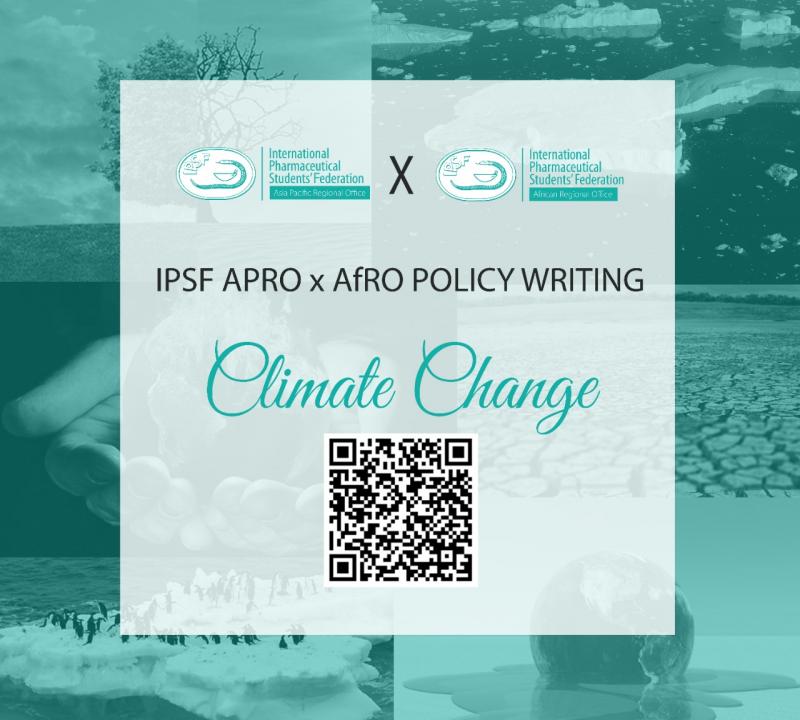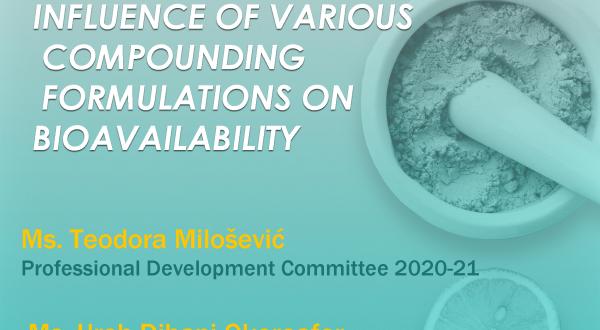
IPSF APRO x AfRO Joint Policy Writing: Climate Change
Joint Policy Writing (IPSF AfRO and APRO): Climate Change Awareness
The International Pharmaceutical Students’ Federation (IPSF) is a leading international advocacy organization for pharmaceutical students and recent graduates. IPSF represents over 500,000 pharmaceutical students and recent graduates from over 92 countries worldwide. The IPSF African Regional Office (AfRO) and the Asia Pacific Regional Office (APRO) are functional extensions of IPSF that coordinate pharmaceutical students’ organisation to advocate public health awareness at a regional level. IPSF AfRO represents 20 member associations from 19 countries in Africa whilst IPSF APRO represents 28 associations from 18 countries in the Asia Pacific Region.
The United Nations (UN) predicts that shifting weather patterns will threaten agriculture, food production, housing and environmental safety.1 These climate changes affect the social and environmental determinants of health through the changes in health costs and the increase in mortality rate.2 Estimates have shown that climate change will threaten food supplies of Sub-Saharan Africa, farm fields and water sources of South and Southeast Asia within the next three decades.3 Additionally, extreme weather conditions put the lives and homes of the coastal cities commonly found in Africa and Asia at risk.
Pharmacists need to be prepared to manage an increasing number of diseases including Neglected Tropical Diseases (NTDs) in the near future through actively engaging in continuous professional education as well as keeping up to date with the pharmacological interventions for common diseases in their area.
In 2019, during the Bangkok air pollution crisis of PM 2.5 (an air pollutant of diameter less than 2.5 micrometers which in high levels, is harmful to health), pharmacists played the important role of spreading awareness about environmental dangers, sharing information about pollution-related health hazards and encouraging the use of N95 face masks.4
Pharmacists also play an important role in spreading awareness about environmental dangers and sharing information on pollution-related health hazards to patients. Pharmacists can take a “green” lead in educating patients about proper use and disposal of medicines as well as healthy lifestyles to take care of the environment and ultimately, their health.5
Education is an essential element in the global initiative to tackle climate change. It imparts “climate literacy” to the youth thus, changing their attitudes and behaviors towards climate change. Climate change education and awareness are the primary means by which UNESCO and IPSF contribute to the fight against climate change.6
In February 2020, IPSF AfRO and APRO led the collaborative project “Climate Change Awareness Campaign”. The campaign was conducted by sharing infographic posters, stories, and quizzes which reached thousands of people worldwide. The campaign tagged “Let's #SavethePlanet!” captured facts, statistics, and the global impacts of climate change in Africa and the Asia Pacific region, with an emphasis on Malaria and NTDs.
Pharmacists and pharmacy students should be equipped to reduce the health implications of climate change through strengthened community advocacy and enlightenment programs, research, partnerships with the World Meteorological Organisation (WMO), UNESCO and accredited organizations of the United Nations Environment Programme (UNEP). All of these can be achieved through continuous awareness and frequent projects such as webinars, symposia, professional development training, and hackathons with a focus on climate change. Pharmacy students are encouraged to organise public health campaigns to educate the community on the dangers of climate change and how to prevent it.
IPSF AfRO and APRO advocates to minimise energy used during pharmaceutical production and minimising pharmaceutical waste. IPSF AfRO and APRO further encourages pharmacy schools to increase climate change awareness by adding courses that educate students about the ecological implication climate change has on health and how pharmacists can be active players.
It is recommended that the government in both continents prioritize climate financing, required for an orderly transition to a low carbon, resilient global economy as a means to reducing emissions, enhancing sinks of greenhouse gases and increasing the resilience of human and ecological systems to negative climate change impacts.7
IPSF AfRO and APRO will continue to consolidate efforts in tackling climate change by encouraging member associations to engage in campaigns, research, webinars, and other innovative public health and professional development activities which raise awareness and contribute to combating climate change.
References
- United Nations. Climate Change [Internet]. Un.org. 2016 [cited 2020 May 14]. Available from: https://www.un.org/en/sections/issues-depth/climate-change/
- World Health Organization: WHO. Climate change and health [Internet]. Who.int. World Health Organization: WHO; 2018 [cited 2020 May 14]. Available from: https://www.who.int/news-room/fact- sheets/detail/climate-change-and-health
- The World Bank. What Climate Change Means for Africa, Asia and the Coastal Poor [Internet]. World Bank. 2013 [cited 2020 May 14]. Available from: https://www.worldbank.org/en/news/feature/2013/06/19/what- climate-change-means-africa-asia-coastal-poor
- mClinica. PM2.5 and the Role of the Pharmacist in a Changing Climate [Internet]. mClinica. 2019 [cited 2020 May 14]. Available from: https://www.mclinica.com/pharmacists-pollution-climate-change/
- Iain Davidson. Time to act: pharmacists must be prepared for environmental changes [Internet]. Pharmaceutical Journal. 2014 [cited 2020 May 14]. Available from: https://www.pharmaceutical- journal.com/opinion/time-to-act-pharmacists-must-be-prepared-for-environmental- changes/11138390.fullarticle?firstPass=false
- UNESCO. Climate Change Education and Awareness [Internet]. UNESCO. 2015 [cited 2020 May 14]. Available from: https://en.unesco.org/themes/addressing-climate-change/climate-change-education-and- awareness
- The World Bank. Climate Finance [Internet]. World Bank. 2019 [cited 2020 June 24]. Available from: https://www.worldbank.org/en/topic/climatefinance
Policy Writing written by:
Spoudy Lucianus
IPSF APRO Secretary Subcommittee 2019-20
Eseosa Favour Iyagbaye
IPSF AfRO Projects Subcommittee 2019-20
|
|
||||
Bill Whilson Baljon
IPSF APRO Secretary Subcommittee 2019-20
Taiwo Olawehinmi
IPSF AfRO Media and Publications Subcommittee
|
|
||||
Policy Writing reviewed by:
Ms. Wendy Yu-Wun Jian
IPSF APRO Secretary 2019-20



